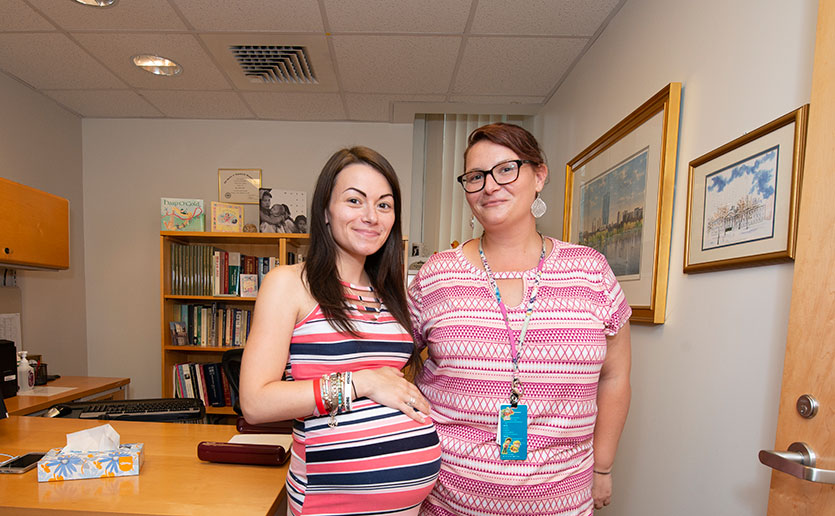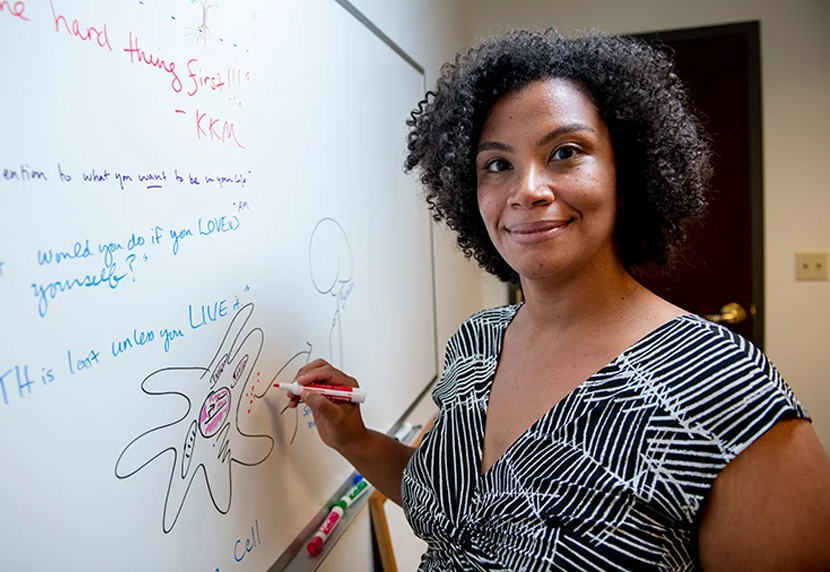To improve the health of infants and mothers, Massachusetts General Hospital has opened the HOPE Clinic, to assist pregnant women like Aryana Moschitto, who is recovering from substance use disorder.

Like most expectant mothers, the 25-year-old is debating names for her daughter, laughing about her baby shower and worrying about her upcoming delivery. But she’s also seeing clinicians in obstetrics, family medicine, addiction medicine, pediatrics and psychiatry, as well as a substance use recovery coach and a social worker at the HOPE Clinic.
“I have been using since I was 13, and trying to get clean since I was 17,” says the mother-to-be, who is now in recovery from opioid use. “But I have never had the support I have gotten through the HOPE Clinic.”
The HOPE in the new clinic’s name is short for “Harnessing support for Opioid and substance use disorder in Pregnancy and Early childhood.” The multidisciplinary effort aims to help pregnant women in recovery from substance use disorder through delivery all the way to their child’s second birthday.
The integrated care model – from pregnancy through age two – is unique to Mass General, and was only made possible thanks to the support of leadership across hospital departments and the dedicated staff and clinicians working to support patients and their families.

A Time of Motivation
“Pregnancy can provide a window of hope to many women who are struggling with substance use disorder,” says pediatrician Davida Schiff, MD, the HOPE Clinic’s medical director. “At that moment of hope, it’s critical to provide the right support that will help these women succeed.”
Jessica R. Gray, MD, HOPE Clinic’s clinical director, says the early parenting years can be very motivating for entering and maintaining recovery from opioid use.
“It is also a formative time for the family unit, when the development of healthy attachment between a mother and her child is so important,” says Dr. Gray, who specializes in addiction and family medicine.
At the clinic, the bond between mothers and infants is carefully nurtured. For example, a child experiencing withdrawal symptoms after birth can be soothed through cuddling, skin-to-skin time and breastfeeding, Dr. Schiff says. The HOPE clinic works with parents to support their infants’ health and wellbeing after delivery and to promote a strong parent-child bond from the first hours of life.

Join Mass General for National Recovery Month in September at a series of education events led by clinicians and staff of the Mass General Substance Use Disorders Initiative to raise awareness of prevention, treatment and recovery support services.
A Collaborative Approach to Substance Use Disorder
Funded through a Medicaid ACO pilot project grant, the HOPE Clinic is a collaborative effort that includes the Mass General departments of Obstetrics and Gynecology, Medicine, Psychiatry, Social Work and Pediatrics. The clinic fits into Mass General’s hospital-wide Substance Use Disorder Initiative which is comprised of an inpatient consult service, a Bridge Clinic for follow-up care, recovery coaches and enhanced care in Mass General’s health centers, Emergency Department, and primary care practices.
So far, the clinic is open only one day a week, and based on demand, the directors would like to expand to a second day. Philanthropic support is needed to help cover the clinical costs of maintaining a multidisciplinary team, while also providing diapers and other infant supplies, healthy snacks, parenting classes, child care and transportation vouchers.
“The complexity of our patients’ medical, psychological and social needs is profound,” Dr. Schiff says. The clinic’s patients are often homeless or living in residential treatment centers. They may be struggling with more than one substance use disorder. Many have been physically or psychologically abused and have ongoing legal issues.
Dr. Schiff says many patients are inspired by Katie Raftery, the HOPE Clinic’s recovery coach, who has had experience with substance use.
“I know how powerful this disease is and I am so grateful to the HOPE Clinic for helping me be vigilant with my recovery.”
Recovery Coaches are Key
“At this clinic,” Ms. Raftery says, “we want to be more than just doctors treating a medical condition. We want to create a sense of stability and security, help them take care of their babies and build a foundation for a healthy family they can take forward on their recovery journey.”
Ms. Raftery, who has two children, says she went into recovery when she was pregnant with her son, and found it was essential to build a “tribe” of people to support her. She decided to become a recovery coach to help do the same.
Ms. Raftery has made a difference for Ms. Moschitto.
“She’s always there for me to talk over things I find overwhelming,” she says. “There’s so much stigma around this disease, but in the HOPE Clinic everyone is accepting and welcoming.”
“January 6, is my ‘recovery date,’ because it’s the day I found out I was pregnant,” Ms. Moschitto adds. “I’m looking at life differently because someone is going to depend on me. But I also know how powerful this disease is and I am so grateful to the HOPE Clinic for helping me be vigilant with my recovery.”
To learn more about the HOPE Clinic or to make a gift, please contact us.

